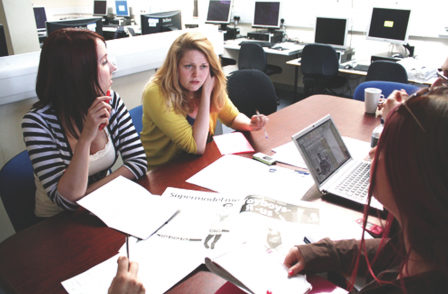
With three fast-track NCTJ centres reporting significant increases in the number of school leavers on their courses, Press Gazette spoke to a selection of the students who have opted to skip university and take the plunge into vocational training.
We revealed last week that some courses had seen the number of students straight from school more than treble since last year.
At Brighton’s Journalist Works, Kristy Barber is among eight other school leavers on the September course, which usually expects two or three.
She originally planned to start a journalism and media course at Middlesex University this autumn, but changed her mind after talking to some working journalists.
“They told me I needed an NCTJ qualification and Middlesex didn’t give me it,” she said.
“I did ask on my open day if they were NCTJ accredited, and if they did shorthand, but they said most people don’t use shorthand these days and I wouldn’t need the qualification.”
By the time Barber decided she needed to do a course with NCTJ accreditation, she was too late to apply for any university courses, so went in search of fast-track courses that would accept school leavers.
“I had a Google and found Journalist Works. It was not a very long course and was going to save me three years of uni’ and lot of debt. So I went for an assessment day and decided I was definitely going there instead of uni’.”
Having started at the beginning of the month, Barber is now enjoying her course and believes it will help her to become a feature writer or columnist.

In Bournemouth, Up To Speed Journalism’s September intake included 14 school leavers – up from six last year – on its course of 30.
Jonathan Bonell, 19, started on the course this week, and is enjoying the opportunity to learn on a vocational course.
“I didn’t want to do another three years of education, so I started browsing alternatives,” he said.
“The fact that it’s only six months is a big factor for me, and also the fact it’s in a work environment is also important.
“At university, I think you’d learn journalism, but you wouldn’t learn how the actual newsroom works.
“For me, I thought it would be a better option than going to university because I didn’t have my heart set on it – it’s a lot of money and a lot of time, and I feel that you do have to be 100 per cent sure.
“When I saw this course I was sold straight away.”
At Up To Speed, trainees learn the base modules – reporting, shorthand, public affairs, law and court reporting – for 12 weeks in the offices of Bournemouth’s Daily Echo, before specialising in the second term of eight weeks.
Bonell plans to specialise in sports journalism.
He said: “I’ve grown up loving sport and I’ve always loved English, and I want to put the two together. For me, it’s a much better option than university.”

Joining him on the course is Peter Summers, 17, who plans to specialise in photojournalism.
Summers did consider university – he got the grades he needed and, coming from Scotland, fee increases were not a factor – but decided against it.
“I want to do my training and get out into the world of work. This course is hands-on and that’s why I wanted to do it,” he said.
“I’d prefer to start working rather than just be in a lecture hall every day – and that’s what attracted me to the NCTJ.”
Summers, who is already a freelance photographer at the Northern Scot, had planned to train as a photographer at the RAF until he broke his back two years ago.
He said: “My school’s course director recommended the NCTJ and then I spoke to some professional photographers, who’d already passed it, and they suggested it was the best way into press photography.”
In Newcastle, Sophie Brownson started on Press Association’s NCTJ course earlier this month and believes she has made the right choice, having enjoyed the experience so far. If things don’t go to plan, she has a deferred place waiting for her at Newcastle University.
She said: “I was always interested in being a journalist at the back of my mind and did apply for journalism and English degrees, but I wouldn’t have gotten the NCTJ, which I was told was important."
Email pged@pressgazette.co.uk to point out mistakes, provide story tips or send in a letter for publication on our "Letters Page" blog
